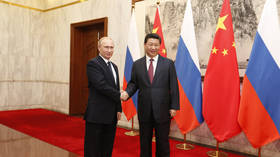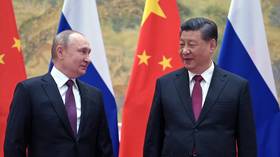EU warns about Russia & China

Moscow and Beijing could soon begin working arm in arm to dismantle the existing status quo of liberal democracy, following a recent declaration from Russian President Vladimir Putin and his Chinese counterpart Xi Jinping, the EU’s top diplomat has claimed amid a growing standoff between East and West.
Speaking to reporters in the US on Tuesday, High Representative for Foreign Affairs Josep Borrell set out his view on the increased partnership between Beijing and Moscow that has seen the two leaders release a joint call for an end to NATO expansion and for the West to dispense with its “Cold War” mentality.
“A joint statement between China and Russia, which has not been very well perceived [by the West] because everybody was looking to Ukraine, may be the foundation stone of a big alliance of two authoritarian regimes,” he weighed in.
According to Borrell, the battle between ‘democracies’ and ‘repressive states’ is still very much waging today and “is going to be the big fight of the century.”
Kremlin Press Secretary Dmitry Peskov hit back at the diplomat’s words on Wednesday, expressing that Moscow “totally disagrees” with the bloc’s rhetoric about authoritarian regimes.
“We do not think the EU has the right to make such assessments about Russia and China,” he explained. “We are large sovereign countries with our own political systems.”
Borrell’s remarks come days after Putin and Xi issued a statement urging NATO “to respect the sovereignty, security, the interests of other countries, and the diversity of their civilizational and cultural-historical ways; and to deal with the peaceful development of other governments objectively and fairly.”
The two heads of state also called for global leaders to “strengthen dialogue and mutual trust, to deepen cooperation, and to defend such universal human values as peace, growth, equality, justice, democracy, and freedom.”
Tensions have flared in recent weeks, with a number of Western leaders warning that Russia’s armed forces could be massing at the Ukrainian border as a prelude to an invasion. The Kremlin has repeatedly insisted that it has no aggressive intentions, and has sought to obtain security guarantees limiting NATO’s expansion into Eastern Europe.
Ahead of Putin and Xi’s negotiations, Kremlin foreign policy advisor Yuri Ushakov stressed that Russia and China have “similar and coinciding positions on a large part of international problems.”
The two nations have stressed the importance of their relationship in a number of areas, including trade, energy, and defense, in the face of Western pressure in recent months. Moscow and Beijing have previously stated their commitment to developing shared financial systems that cannot be influenced by other states, as well as looking to move away from the US dollar to underpin their increasing trade.
Despite signs of growing cooperation between Russia and China, a number of analysts have hinted that the partnership is less integrated in comparison to blocs like NATO, where members have sought to collaborate on military and intelligence-sharing.













